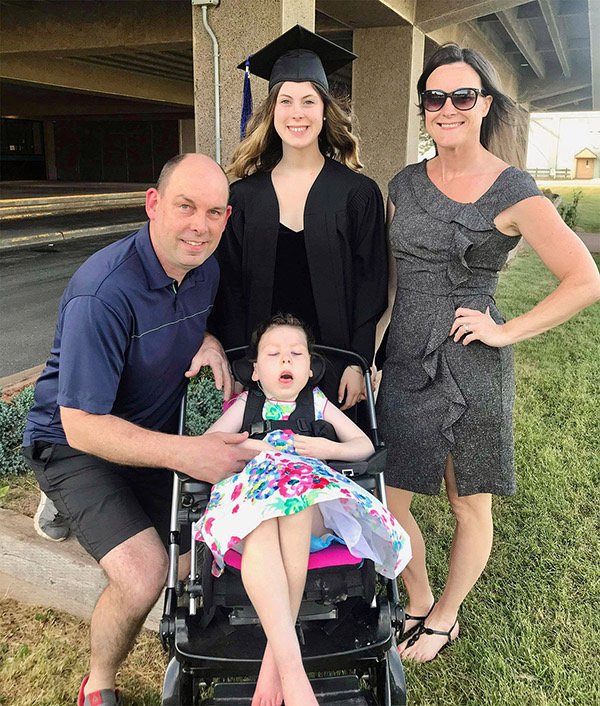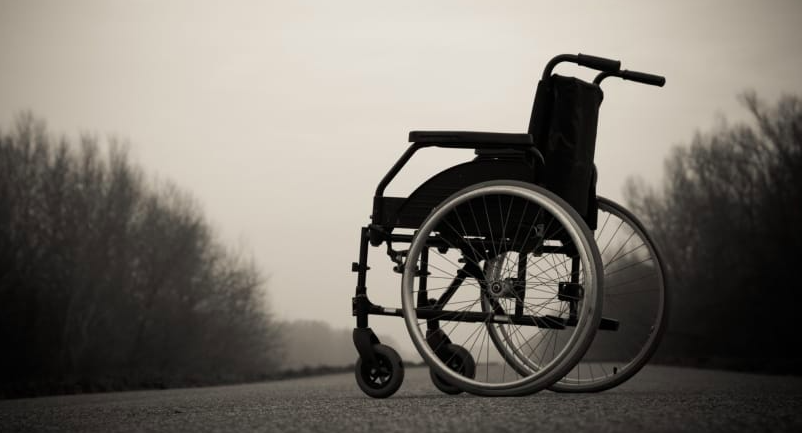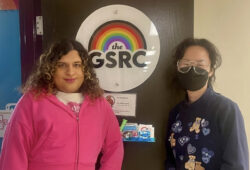Around the clock care. School closures. Appointment cancellations. Limited social support. Isolation. These have been the realities facing Kristen Langille this past year as she cared for her youngest daughter, Georgia.
Georgia, 8, suffers from congenital disorders stemming from glycosylation, and requires 24/7 care.

Pre-pandemic, Langille relied on a host of family, friends and nurses for support. But in the past year, the burden has fallen on Kristen as her daughter’s primary caregiver.
“I really felt it on my mental health the first few months,” says Langille.
“I’m used to getting nurse respite … (but) my daughter also has zero immune system, so we didn’t want anyone bringing anything in.”
Langille’s experience is not uncommon.
Easter Seals Canada reports that more than 200,000 children across Canada are living with a disability affecting their level of freedom, independence or quality of life. As a result, caregiver and parental responsibilities have multiplied because of the pandemic.
Experts warn that in the long term, the pandemic’s isolating environment doubled with the lack of community support can take a huge toll on the mental health of parents caring for children with disabilities.
Dr. David Price, chair of McMaster University’s department of family medicine, says the challenges these families experience can often be hidden, especially in a pandemic where there is already a baseline level of fatigue and anxiety among all parents.
“If you add in a child who has disabilities in one form or another, that whole level of stress is compounded,” said Price.
“There aren’t the after-school activities, there aren’t the day cares, there aren’t the stress relievers that parents can have. (For) a parent who has got a child who is severely disabled, it’s a 24/7 job and they are doing that on top of their own jobs.”
Dr. Robert McInerney, a neuropsychologist at Dr. Robert J. McInerney & Associates Ltd., notes programs allow the child and the parent to ‘recharge’.
“Now that kids aren’t leaving home ... it becomes a pressure cooker, they can’t get away from each other, so parents and caregivers are being worn down by the 24/7 demands,” said McInerney.
Parents caring for children with disabilities also experience heightened concern for their childrens’ well-being, according to a Statistics Canada study on the impact of the pandemic on Canadian families. Their data, released in August 2020, found that for every type of concern, the anxieties of parents caring for children with disabilities were higher than parents of children who do not have disabilities.
For example, almost 60 per cent of parents caring for children with disabilities were concerned for their child’s academic success, compared to 35 per cent of parents caring for children without disabilities.
This is expected in some sense, explains Price, as the pandemic has resulted in a concerning ‘multiplier effect’ of spiralling anxieties.
“There’s the anxiety about your child getting COVID, about you bringing COVID home to the house, you getting COVID and then suddenly you need to isolate from your child...how the heck do you do that if you’re (the) principal caregiver?” said Price. “Then you add the fatigue and the burnout.”
The pandemic has highlighted the dangers of extreme social isolation, particularly when individuals are in need of connection, explains McInerney.
“The isolation that COVID has imposed on us is unnatural and unhealthy and it goes against everything that is good for mental health,” said McInerney.
These feelings of loneliness and isolation have increased for many Canadians, according to an Angus Reid survey released in October 2020. It reported the decrease in community activity has taken its toll on Canadians.
The survey found that those suffering from both loneliness and isolation rose by 10 per cent over last year, and the percentage of those who felt completely connected in 2019 dropped by almost half in 2020.
Andrea Pothier, who gave birth to her son Bruin on April 30, 2020, struggled with some of these feelings.
The first 25 days of Bruin’s life were in hospital where he was diagnosed with cerebral palsy, Pothier became his primary caregiver just as Canada was entering its first lockdown. She stayed at the hospital 24/7, while the rest of her family formed its own bubble at home.
“It wasn’t just hard on me, but my entire family,” says Pothier. “My husband had to take stress leave from work," she said. "It was already a horrible situation to begin with, but COVID added a whole new element.”
Pothier explained that while Bruin was in the hospital, she didn’t have time to focus on her own mental health. She says her experience has proven that leaning upon a community is essential, for her as well as other parents.
“It’s just a lot for one person to deal with,” said Pothier. “Having people there, even though the situation is… ‘sucky,’ at least there’s someone there to share that with you.”
Price notes the importance of recognizing and bringing awareness to the reality parents are silently experiencing.
“This is often hidden, sometimes we don’t recognize it,” said Price.
“It is important for us where we have the opportunity as employers, as colleagues, as friends, to reach out and just understand the situation and see how you can help.”




